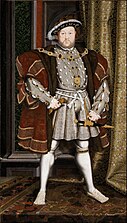Divine right of kings
| Part of the Politics series |
| Monarchy |
|---|
 |
|
|
| Rights |
|---|
 |
| Theoretical distinctions |
| Human rights |
| Rights by beneficiary |
| Other groups of rights |
|
| Part of a series on |
| Integralism |
|---|
 |
In European Christianity, the divine right of kings, divine right, or God's mandation, is a political and religious doctrine of political legitimacy of a monarchy. It is also known as the divine-right theory of kingship.
The doctrine asserts that a monarch is not accountable to any earthly authority (such as a parliament or the Pope) because their right to rule is derived from divine authority. Thus, the monarch is not subject to the will of the people, of the aristocracy, or of any other estate of the realm. It follows that only divine authority can judge a monarch, and that any attempt to depose, dethrone, resist or restrict their powers runs contrary to God's will and may constitute a sacrilegious act. It does not imply that their power is absolute.[1]: 858
In its full-fledged form, the Divine Right of Kings is associated with Henry VIII of England (and the Acts of Supremacy), James VI and I of Scotland and England, Louis XIV of France, and their successors.
In contrast, the conception of human rights started being developed during the Middle Ages by scholars such as St. Thomas Aquinas (see Natural Law) and were systematised by the thinkers of the Age of Enlightenment, e.g. John Locke. Liberty, dignity, freedom and equality are examples of important human rights.
Concepts
[edit]Divine right has been a key element of the self-legitimisation of many absolute monarchies, connected with their authority and right to rule. Related but distinct notions include Caesaropapism (the complete subordination of bishops etc. to the secular power), Supremacy (the legal sovereignty of the civil laws over the laws of the Church), Absolutism (a form of monarchical or despotic power that is unrestrained by all other institutions, such as churches, legislatures, or social elites) or Tyranny (an absolute ruler who is unrestrained even by moral law).
Historically, many notions of rights have been authoritarian and hierarchical, with different people granted different rights and some having more rights than others. For instance, the right of a father to receive respect from his son did not indicate a right for the son to receive a return from that respect. Analogously, the divine right of kings, which permitted absolute power over subjects, provided few rights for the subjects themselves.[2]
It is sometimes signified by the phrase "by the Grace of God" or its Latin equivalent, Dei Gratia, which has historically been attached to the titles of certain reigning monarchs. Note, however, that such accountability only to God does not per se make the monarch a sacred king.
Pre-Christian conceptions
[edit]Hinduism
[edit]The Hindu text Mahabharata contains several concepts of kingship, especially underscoring its divine origins. The king is considered an embodiment of Indra, and fealty to him is considered as submitting to divine authority. In the Rajadharmanusasana Parva, Bhishma talks of the period before men had kings, and there was chaos all around -
It has been heard by us that men, in days of old, in consequence of anarchy, met with destruction, devouring one another like stronger fishes devouring the weaker ones in the water. It has been heard by us that a few amongst them then, assembling together, made certain compacts, saying, 'He who becomes harsh in speech, or violent in temper, he who seduces or abducts other people’s wives or robs the wealth that belongs to others, should be cast off by us.' For inspiring confidence among all classes of the people, they made such a compact and lived for some time. Assembling after some time they proceeded in affliction to the Grandsire, saying, 'Without a king, O divine lord, we are going to destruction. Appoint some one as our king. All of us shall worship him and he shall protect us.'.[3]
The Mahabharata also mentions that in a land without king or royal authority, Vedic rituals are ineffectual and Agni does not convey sacrificial libations to the gods.
Zoroastrianism (Iranian world)
[edit]
Khvarenah (also spelled khwarenah or xwarra(h): Avestan: 𐬓𐬀𐬭𐬆𐬥𐬀𐬵 xᵛarənah; Persian: فرّ, romanized: far) is an Iranian and Zoroastrian concept, which literally means glory, about divine right of the kings. This may stem from early Mesopotamian culture, where kings were often regarded as deities after their death. Shulgi of Ur was among the first Mesopotamian rulers to declare himself to be divine. In the Iranian view, kings would never rule, unless Khvarenah is with them, and they will never fall unless Khvarenah leaves them. For example, according to the Kar-namag of Ardashir, when Ardashir I of Persia and Artabanus V of Parthia fought for the throne of Iran, on the road Artabanus and his contingent are overtaken by an enormous ram, which is also following Ardashir. Artabanus's religious advisors explain to him that the ram is the manifestation of the khwarrah of the ancient Iranian kings, which is leaving Artabanus to join Ardashir.[4]
Roman Empire
[edit]The Imperial cult of ancient Rome identified Roman emperors and some members of their families with the "divinely sanctioned" authority (auctoritas) of the Roman State. The official offer of cultus to a living emperor acknowledged his office and rule as divinely approved and constitutional: his Principate should therefore demonstrate pious respect for traditional Republican deities and mores. Many of the rites, practices and status distinctions that characterized the cult to emperors were perpetuated in the theology and politics of the Christianised Empire.[5]
Judaism
[edit]While the earliest references to kingship in Israel proclaim that "14 "When you come to the land that the Lord your God is giving you, and you possess it and dwell in it and then say, 'I will set a king over me, like all the nations that are around me,' 15 you may indeed set a king over you whom the Lord your God will choose. One from among your brothers you shall set as king over you. You may not put a foreigner over you, who is not your brother." (Deut 17:14-15), significant debate on the legitimacy of kingship has persisted in Rabbinical Judaism until Maimonides, though many mainstream currents continue to reject the notion.
The controversy is highlighted by the instructions to the Israelites in the above-quoted passage, as well as the passages in 1 Samuel 8 and 12, concerning the dispute over kingship; and Perashat Shoftim.[6] It is from 1 Samuel 8 that the Jews receive mishpat ha-melech, the ius regium, or the law of kingship, and from this passage that Maimonides finally concludes that Judaism supports the institution of monarchy, stating that the Israelites had been given three commandments upon entering the land of Israel - to designate a king for themselves, to wipe out the memory of Amalek, and to build the Temple.[7]
The debate has primarily centered around the problem of being told to "designate" a king, which some rabbinical sources have argued is an invocation against a divine right of kings, and a call to elect a leader, in opposition to a notion of a divine right. Other rabbinical arguments have put forward an idea that it is through the collective decision of the people that God's will is made manifest, and that the king does therefore have a divine right - once appointed by the nation, he is God's emissary.
Jewish law requires one to recite a special blessing upon seeing a monarch: "Blessed are You, L‑rd our G‑d, King of the universe, Who has given from His glory to flesh and blood".[8]
European conceptions
[edit]With the rise of firearms, nation-states and the Protestant Reformation in the late 16th century, the theory of divine right justified the king's absolute authority in both political and spiritual matters.[further explanation needed] Henry VIII of England declared himself the Supreme Head of the Church of England and exerted the power of the throne more than any of his predecessors.
As a political theory, it was further developed by James VI of Scotland (1567–1625) and came to the fore in England under his reign as James I of England (1603–1625). Louis XIV of France (1643–1715) strongly promoted the theory as well.
Historian J.P. Sommerville stresses the theory was polemic: "Absolutists magnified royal power. They did this to protect the state against anarchy and to refute the ideas of resistance theorists", those being in Britain Catholic and Presbyterian theorists.[1]
The concept of divine right incorporates, but exaggerates, the ancient Christian concept of "royal God-given rights", which teach that "the right to rule is anointed by God",[citation needed] although this idea is found in many other cultures, including Aryan and Egyptian traditions.
Biblical background
[edit]The Christian notion of a divine right of kings is traced to a story found in 1 Samuel, where the prophet Samuel anoints Saul and then David[9] as Messiah ("anointed one")—king over Israel. In the Jewish traditions, the lack of a divine leadership represented by an anointed king, beginning shortly after the death of Joshua, left the people of Israel vulnerable, and the promise of the "promised land" was not fully fulfilled until a king was anointed by a prophet on behalf of God.
The effect of anointing was seen to be that the monarch became inviolable, so that even when Saul sought to kill David, David would not raise his hand against him because "he was the Lord's anointed". Raising a hand to a king was therefore considered to be as sacrilegious as raising a hand against God and stood on equal footing as blasphemy. In essence, the king stood in place of God and was never to be challenged "without the challenger being accused of blasphemy" - except by a prophet, which under Christianity was replaced by the church.
Medieval periods
[edit]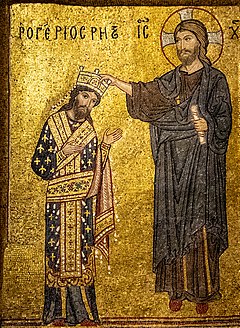
Outside of Christianity, kings were often seen as ruling with the backing of heavenly powers.
Early Middle Ages
[edit]Although the later Roman Empire had developed the European concept of a divine regent in Late Antiquity, Adomnan of Iona provides one of the earliest written examples of a Western medieval concept of kings ruling with divine right. He wrote of the Irish King Diarmait mac Cerbaill's assassination and claimed that divine punishment fell on his assassin for the act of violating the monarch.
Adomnan also recorded a story about Saint Columba supposedly being visited by an angel carrying a glass book, who told him to ordain Aedan mac Gabrain as King of Dal Riata. Columba initially refused, and the angel answered by whipping him and demanding that he perform the ordination because God had commanded it. The same angel visited Columba on three successive nights. Columba finally agreed, and Aedan came to receive ordination. At the ordination, Columba told Aedan that so long as he obeyed God's laws, then none of his enemies would prevail against him, but the moment he broke them, this protection would end, and the same whip with which Columba had been struck would be turned against the king.
Adomnan's writings most likely influenced other Irish writers, who in turn influenced continental ideas as well. Pepin the Short's coronation may have also come from the same influence.[10] The Byzantine Empire can be seen as the progenitor of this concept (which began with Constantine I). This in turn inspired the Carolingian dynasty and the Holy Roman Emperors, whose lasting impact on Western and Central Europe further inspired all subsequent Western ideas of kingship.
High Middle Ages
[edit]In the Middle Ages, the idea that God had granted certain earthly powers to the monarch, just as he had given spiritual authority and power to the church, especially to the Pope, was already a well-known concept long before later writers coined the term "divine right of kings" and employed it as a theory in political science.
However, the dividing line for the authority and power was a subject of frequent contention: notably in England with the murder of Archbishop Thomas Beckett (1170). For example, Richard I of England declared at his trial during the diet at Speyer in 1193: "I am born in a rank which recognizes no superior but God, to whom alone I am responsible for my actions", and it was Richard who first used the motto "Dieu et mon droit" ("God and my right") which is still the motto of the Monarch of the United Kingdom.[11]
Thomas Aquinas condoned extra-legal tyrannicide in the worst of circumstances:
When there is no recourse to a superior by whom judgment can be made about an invader, then he who slays a tyrant to liberate his fatherland is [to be] praised and receives a reward.
— Thomas Aquinas, Commentary on the Magister Sententiarum (Sentences II, Distinction 44, question 2, article 2)[12][better source needed]
On the other hand, Aquinas forbade the overthrow of any morally, Christianly and spiritually legitimate king by his subjects. The only human power capable of deposing the king was the pope. The reasoning was that if a subject may overthrow his superior for some bad law, who was to be the judge of whether the law was bad? If the subject could so judge his own superior, then all lawful superior authority could lawfully be overthrown by the arbitrary judgement of an inferior, and thus all law was under constant threat.
According to John of Paris, kings had their jurisdictions and bishops (and the pope) had theirs, but kings derived their supreme, non-absolute temporal jurisdiction from popular consent.[13]
Late Middle Ages and Renaissance
[edit]The Church was the final guarantor that Christian kings would follow the laws and constitutional traditions of their ancestors and the laws of God and of justice.[14]
Radical English theologian John Wycliffe's theory of Dominium meant that injuries inflicted on someone personally by a king should be born by them submissively, a conventional idea, but that injuries by a king against God should be patiently resisted even to death; gravely sinful kings and popes forfeited their (divine) right to obedience and ownership, though the political order should be maintained.[15] More aggressive versions of this were taken up by Lollards and Hussites.
For Erasmus of Rotterdam it was the consent of the people which gives and takes away "the purple",[16]: 95 not an unchangeable divine mandate.
Catholic limits
[edit]Catholic jurisprudence holds that the monarch is always subject to natural and divine law, which are regarded as superior to the monarch.[17]
The possibility of monarchy declining morally, overturning natural law, and degenerating into a tyranny oppressive of the general welfare was answered theologically with the Catholic concept of the spiritual superiority of the Pope (there is no "Catholic concept of extra-legal tyrannicide", as some falsely suppose, the same being expressly condemned by St Thomas Aquinas in chapter 7 of his De Regno).
Catholic thought justified limited submission to the monarchy by reference to the following:
- The Old Testament, in which God chose kings to rule over Israel, beginning with Saul who was then rejected by God in favour of David, whose dynasty continued (at least in the southern kingdom) until the Babylonian captivity.
- The New Testament, in which the first pope, Peter, commands that all Christians shall honour the Roman Emperor,[18] even though, at that time, he was still a pagan emperor. Paul agreed with Peter that subjects should be obedient to the powers that be because they are appointed by God, as he wrote in his Epistle to the Romans.[19] Likewise, Jesus Christ proclaims in the Gospel of Matthew that one should "Render unto Caesar the things which are Caesar's"; that is at first, literally, the payment of taxes as binding those who use the imperial currency.[20] Jesus told Pontius Pilate that his authority as Roman governor of Judaea came from heaven according to John 19:10–11.[citation needed]
- The endorsement by the popes and the church of the line of emperors beginning with the Emperors Constantine and Theodosius, later the Eastern Roman emperors, and finally the Western Roman emperor, Charlemagne and his successors, the Catholic Holy Roman Emperors.
Reformation-period conceptions
[edit]The divine right of kings, or divine-right theory of kingship, is a political and religious doctrine of royal and political legitimacy. It asserts that a monarch is subject to no earthly authority, deriving his right to rule directly from the will of God. The king is thus not subject to the will of his people, the aristocracy, or any other estate of the realm, including (in the view of some, especially in Protestant countries) the church.
A weaker or more moderate form of this political theory does hold, however, that the king is subject to the church and the pope, although completely irreproachable in other ways; but according to this doctrine in its strong form, only God can judge an unjust king.
The doctrine implies that any attempt to depose the king or to restrict his powers runs contrary to the will of God and may constitute a sacrilegious act.
Scottish
[edit]The Scots textbooks of the divine right of kings were written in 1597–1598 by James VI of Scotland. His Basilikon Doron, a manual on the powers of a king, was written to edify his four-year-old son Henry Frederick that a king "acknowledgeth himself ordained for his people, having received from God a burden of government, whereof he must be countable".
The conception of ordination brought with it largely unspoken parallels with the Anglican and Catholic priesthood, but the overriding metaphor in James VI's 'Basilikon Doron' was that of a father's relation to his children. "Just as no misconduct on the part of a father can free his children from obedience to the fifth commandment."[21]
British
[edit]James, after becoming James I of England, also had printed his Defense of the Right of Kings in the face of English theories of inalienable popular and clerical rights.
He based his theories in part on his understanding of the Bible, as noted by the following quote from a speech to parliament delivered in 1610 as James I of England:
The state of monarchy is the supremest thing upon earth, for kings are not only God's lieutenants upon earth and sit upon God's throne, but even by God himself, they are called gods. There be three principal [comparisons] that illustrate the state of monarchy: one taken out of the word of God, and the two other out of the grounds of policy and philosophy. In the Scriptures, kings are called gods, and so their power after a certain relation compared to the Divine power. Kings are also compared to fathers of families; for a king is true parens patriae [parent of the country], the politic father of his people. And lastly, kings are compared to the head of this microcosm of the body of man.[22]
James's reference to "God's lieutenants" is apparently a reference to the text in Romans 13 where Paul refers to "God's ministers".
(1) Let every soul be subject unto the higher powers. For there is no power but of God: the powers that be are ordained of God. (2) Whosoever, therefore, resisteth the power, resisteth the ordinance of God: and they that resist shall receive to themselves damnation. (3) For rulers are not a terror to good works, but to the evil. Wilt thou then not be afraid of the power? do that which is good, and thou shalt have praise of the same: (4) For he is the minister of God to thee for good. But if thou do that which is evil, be afraid; for he beareth not the sword in vain: for he is the minister of God, a revenger to execute wrath upon him that doeth evil. (5) Wherefore ye must needs be subject, not only for wrath but also for conscience sake. (6) For this cause pay ye tribute also: for they are God's ministers, attending continually upon this very thing. (7) Render therefore to all their dues: tribute to whom tribute is due; custom to whom custom; fear to whom fear; honour to whom honour.[23]
Ceremonial conflation
[edit]Some of the symbolism within the coronation ceremony for British monarchs, in which they are anointed with holy oils by the Archbishop of Canterbury, thereby ordaining them to monarchy, perpetuates the ancient Roman Catholic monarchical ideas and ceremonial (although few Protestants realize this, the ceremony is nearly entirely based upon that of the Coronation of the Holy Roman Emperor).[citation needed] However, in the UK, the symbolism ends there since the real governing authority of the monarch was all but extinguished by the Whig revolution of 1688–89 (see Glorious Revolution). The king or queen of the United Kingdom is one of the last monarchs still to be crowned in the traditional Christian ceremonial, which in most other countries has been replaced by an inauguration or other declaration.[citation needed]
In England, it is not without significance that the sacerdotal vestments, generally discarded by the clergy – dalmatic, alb and stole – continued to be among the insignia of the sovereign (see Coronation of the British monarch). Moreover, this sacrosanct character he acquired not by virtue of his "sacring", but by hereditary right; the coronation, anointing and vesting were but the outward and visible symbol of a divine grace adherent in the sovereign by virtue of his title. Even Roman Catholic monarchs, like Louis XIV, would never have admitted that their coronation by the archbishop constituted any part of their title to reign; it was no more than the consecration of their title.[24]
French
[edit]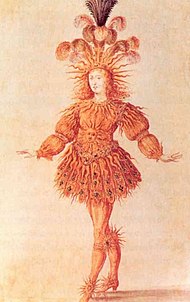
The French prelate Jacques-Bénigne Bossuet made a classic statement of the doctrine of divine right in a sermon preached before King Louis XIV:[25]
Les rois règnent par moi, dit la Sagesse éternelle: 'Per me reges regnant'; et de là nous devons conclure non seulement que les droits de la royauté sont établis par ses lois, mais que le choix des personnes est un effet de sa providence.
Kings reign by Me, says Eternal Wisdom: "Per me reges regnant" [in Latin]; and from that we must conclude not only that the rights of royalty are established by its laws, but also that the choice of persons [to occupy the throne] is an effect of its providence.
The French Huguenot nobles and clergy, having rejected the pope and the Catholic Church, were left only with the supreme power of the king who, they taught, could not be gainsaid or judged by anyone. Since there was no longer the countervailing power of the papacy and since the Church of England was a creature of the state and had become subservient to it, this meant that there was nothing to regulate the powers of the king, and he became an absolute power. In theory, divine, natural, customary, and constitutional law still held sway over the king, but, absent a superior spiritual power, it was difficult to see how they could be enforced since the king could not be tried by any of his own courts.
German
[edit]One passage in scripture supporting the idea of the divine right of kings was used by Martin Luther, when urging the secular authorities to crush the Peasant Rebellion of 1525 in Germany in his Against the Murderous, Thieving Hordes of Peasants, basing his argument on Paul's Epistle to the Romans.[26]
It is related to the ancient Catholic philosophies regarding monarchy, in which the monarch is God's vicegerent upon the earth and therefore subject to no inferior power.[citation needed]
Protestantism
[edit]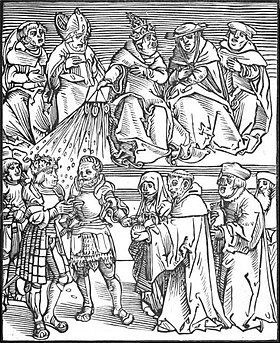
Before the Reformation the anointed king was, within his realm, the accredited vicar of God for secular purposes (see the Investiture Controversy); after the Reformation he (or she if queen regnant) became this in Protestant states for religious purposes also.[28]
Opposition
[edit]In the sixteenth century, both Catholic and Protestant political thinkers alike challenged the idea of a monarch's "divine right".
Catholic
[edit]| Part of a series on |
| Integralism |
|---|
 |
The Spanish Catholic historian Juan de Mariana put forward the argument in his book De rege et regis institutione (1598) that since society was formed by a "pact" among all its members, "there can be no doubt that they are able to call a king to account".[29][30] Mariana thus challenged divine right theories by stating in certain circumstances, tyrannicide could be justified.
Cardinal Robert Bellarmine also "did not believe that the institute of monarchy had any divine sanction" and shared Mariana's belief that there were times where Catholics could lawfully remove a monarch.[30]
Protestant
[edit]Among groups of English Protestant exiles fleeing from Queen Mary I, some of the earliest anti-monarchist publications emerged. "Weaned off uncritical royalism by the actions of Queen Mary ... The political thinking of men like Ponet, Knox, Goodman and Hales."[31]
In 1553, Mary I, a Roman Catholic, succeeded her Protestant half-brother, Edward VI, to the English throne. Mary set about trying to restore Roman Catholicism by making sure that: Edward's religious laws were abolished in the Statute of Repeal Act (1553); the Protestant religious laws passed in the time of Henry VIII were repealed; and the Revival of the Heresy Acts were passed in late 1554.
When Thomas Wyatt the Younger instigated what became known as Wyatt's rebellion in early 1554, John Ponet, the highest-ranking ecclesiastic among the exiles,[32] allegedly participated in the uprising.[33] He escaped to Strasbourg after the Rebellion's defeat and, the following year, he published A Shorte Treatise of Politike Power, in which he put forward a theory of justified opposition to secular rulers.
Ponet's treatise comes first in a new wave of anti-monarchical writings ... It has never been assessed at its true importance, for it antedates by several years those more brilliantly expressed but less radical Huguenot writings which have usually been taken to represent the Tyrannicide-theories of the Reformation.
— A.G. Dickens[32]
Ponet's pamphlet was republished on the eve of King Charles I's execution.
Enlightenment
[edit]According to U.S. President John Adams, Ponet's work contained "all the essential principles of liberty, which were afterward dilated on by Sidney and Locke", including the idea of a three-branched government.[34]
Over time, opposition to the divine right of kings came from a number of sources, including poet John Milton in his pamphlet The Tenure of Kings and Magistrates, and Thomas Paine in his pamphlet Common Sense. By 1700 an Anglican Archbishop was prepared to assert that Kings hold their Crowns by law alone, and the law may forfeit them.
Probably the two most famous declarations of a right to revolution against tyranny in the English language are John Locke's Essay concerning The True Original, Extent, and End of Civil-Government and Thomas Jefferson's formulation in the United States Declaration of Independence that "all men are created equal".
Peak and decline
[edit]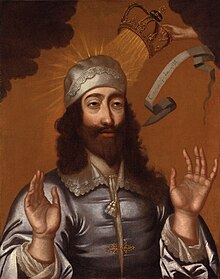
| Part of the Politics series on |
| Toryism |
|---|
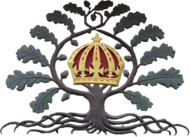 |
In England the doctrine of the divine right of kings was developed to its most extreme logical conclusions during the political controversies of the 17th century; its most famous exponent was Sir Robert Filmer. It was the main issue to be decided by the English Civil War, the Royalists holding that "all Christian kings, princes and governors" derive their authority direct from God, the Parliamentarians that this authority is the outcome of a contract, actual or implied, between sovereign and people.[24]
In one case the king's power would be unlimited, according to the famous saying misattributed to Louis XIV: "L' état, c'est moi",[24] or limited only by his own free act; in the other his actions would be governed by the advice and consent of the people, to whom he would be ultimately responsible. The victory of this latter principle was proclaimed to all the world by the execution of Charles I.
The doctrine of divine right, indeed, for a while drew nourishment from the blood of the royal "martyr";[24] it was the guiding principle of the Anglican Church of the Restoration; but it suffered a rude blow when James II of England made it impossible for the clergy to obey both their conscience and their king.
The Glorious Revolution of 1688 made an end of it as a great political force. This has led to the constitutional development of the Crown in Britain, as held by descent modified and modifiable by parliamentary action.[24]
Related concepts in other religions
[edit]- Mandate of Heaven and monarch as the Son of Heaven - Sinosphere
- Madkhalism - Islam
- Monarchs who are also deities:
- Sacred kings - the occupant of the monarchy gains religious significance or has support from a deity
- Cakravartin - South Asia
- Kut - Central Asia
See also
[edit]- Absolutism (European history)
- Absolute monarchy
- Theocracy
- Ancien Régime – the government in France justified by the divine right of kings
- Caliphate
- Church and state in medieval Europe
- Cuius regio, eius religio – the European idea that the religion of the people follows the religion of the ruler
- Exclusive right
- Royal prerogative
- Vindiciae contra tyrannos – a tract opposing the divine right of kings
- Sacred king
- Divine command theory
References
[edit]- ^ a b Burgess, Glenn (1992). "The Divine Right of Kings Reconsidered". The English Historical Review. 107 (425): 837–861. doi:10.1093/ehr/CVII.CCCCXXV.837. ISSN 0013-8266. JSTOR 574219.
- ^ "Divine Right of Kings". BBC. October 11, 2007. Retrieved December 21, 2009.
[...] the idea that a king was sacred, appointed by God and above the judgment of earthly powers [...] was called the Divine Right of Kings and it entered so powerfully into British culture during the 17th century that it shaped the pomp and circumstance of the Stuart monarchs, imbued the writing of Shakespeare and provoked the political thinking of Milton and Locke.
- ^ "Section LXVII [Mahabharata, English]". 17 August 2021.
- ^ Kar namag i Ardashir 4.11.16 and 4.11.22-23.
- ^ Allen Brent, The Imperial Cult and the Development of Church Order: Concepts and Images of Authority in Paganism and Early Christianity before the Age of Cyprian (Brill, 1999)
- ^ Polish, David (1991). "RABBINIC VIEWS ON KINGSHIP — A STUDY IN JEWISH SOVEREIGNTY". Jewish Political Studies Review. 3 (1/2): 67–90. ISSN 0792-335X. JSTOR 25834198.
- ^ Polish, David (Spring 1991). "RABBINIC VIEWS ON KINGSHIP — A STUDY IN JEWISH SOVEREIGNTY". Jewish Political Studies Review. 3 (1/2). Jerusalem: Jerusalem Center for Public Affairs: 67–90. ISSN 0792-335X. JSTOR 25834198.
- ^ Shurpin, Yehuda. "Rabbi, Is There a Blessing for the Czar? How about the president?". Chabad.
- ^ "1 Samuel 16". Biblegateway. Retrieved 18 September 2022.
- ^ Adomnan of Iona. Life of St Columba. Penguin Books, 1995
- ^ Duncan, Jonathan (1994). The dukes of Normandy, from the time of Rollo to the expulsion of King John. Chadwyck-Healey. OCLC 1313683172.
- ^ McDonald, Hugh. "Some Brief Remarks on what Thomas has to say on Rebellion and Regicide". Archived from the original on 2011-09-27. Retrieved 2011-07-30.
- ^ Werbos, Chris; Latham, Andrew (6 April 2020). "The Medieval Foundations of the Theory of Sovereignty". E-International Relations. Retrieved 20 August 2023.
- ^ Similarly, the Chinese concept of Mandate of Heaven required that the emperor properly carry out the proper rituals and consult his ministers; however, this concept made it extremely difficult to undo any acts carried out by an ancestor.
- ^ Rao, H. Krishna (1942). "John Wycliffe". The Indian Journal of Political Science. 3 (4): 372–379. ISSN 0019-5510. JSTOR 42754272.
- ^ Kloss, Waldemar (1907). "Erasmus's Place in the History of Philosophy". The Monist. 17 (1): 84–101. doi:10.5840/monist190717138. ISSN 0026-9662. JSTOR 27900019.
- ^ Until the unification of Italy, the Holy See did, from the time Christianity became the Roman state religion, assert on that ground its primacy over secular princes; however this exercise of power never, even at its zenith, amounted to theocracy, even in jurisdictions where the Bishop of Rome was the temporal authority.
- ^ 1 Peter 2:13–20
- ^ Romans 13:1–7
- ^ See Matthew 22:15–22
- ^ that is, the commandment: "Honor your father ..." etc.,... but to be according to the law, yet is he not bound thereto but of his goodwill ..."
- ^ A speech to parliament (1610).
- ^ Romans 13:1–7
- ^ a b c d e Phillip 1911, p. 806.
- ^ Jacques-Bénigne Bossuet (1845). Sermons choisis de Bossuet. Sur le devoir des rois. Firmin-Didot. p. 219.
bossuet sermons royalty.
- ^ Romans 13:1–7
- ^ Passional Christi und Antichristi Full view on Google Books
- ^ One or more of the preceding sentences incorporates text from a publication now in the public domain: Phillip, Walter Alison (1911). "King § Divine Right of Kings". In Chisholm, Hugh (ed.). Encyclopædia Britannica. Vol. 15 (11th ed.). Cambridge University Press. p. 806.
- ^ Baer, Robert V. Power & Freedom: Political Thought and Constitutional Politics in the United States and Argentina ProQuest, 2008 ISBN 0549745106 (pp. 70–71)
- ^ a b Blumenau, Ralph. Philosophy and Living Imprint Academic, 2002 ISBN 0907845339 (pp. 198–199)
- ^ Dickens, A. G. (1978). The English Reformation. London & Glasgow: Fontana/Collins. p. 399.
- ^ a b Dickens, A. G. (1978). The English Reformation. London & Glasgow: Fontana/Collins. p. 391.
- ^ Dickens, A.G. (1978). The English Reformation. London & Glasgow: Fontana/Collins. p. 358.
- ^ Adams, C. F. (1850–56). The Works of John Adams, with Life. Vol. 6. Boston. p. 4.
{{cite book}}: CS1 maint: location missing publisher (link)
Further reading
[edit]- Burgess, Glenn (October 1992). "The Divine Right of Kings Reconsidered". The English Historical Review. 107 (425): 837–861. doi:10.1093/ehr/cvii.ccccxxv.837.
External links
[edit]- The Divine Right of Kings on In Our Time at the BBC

